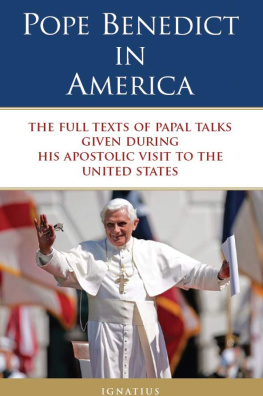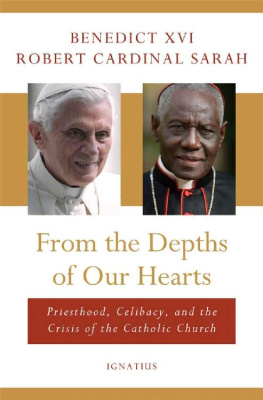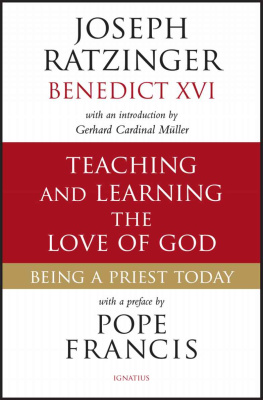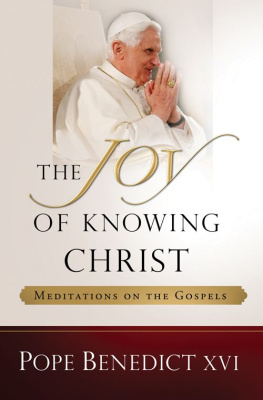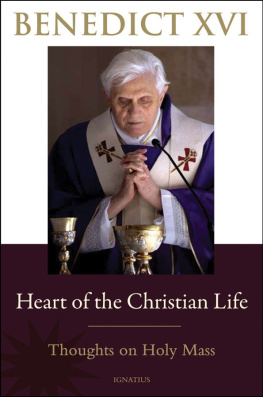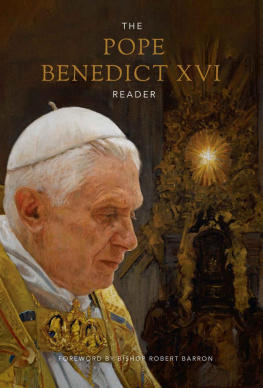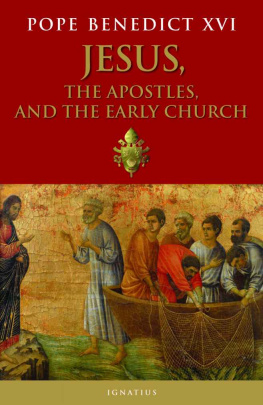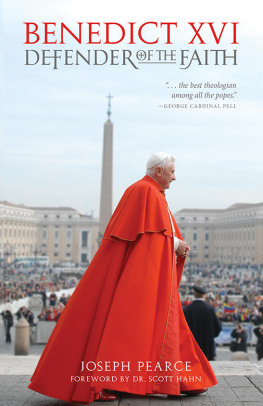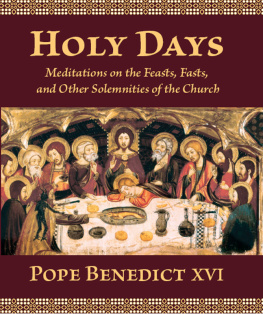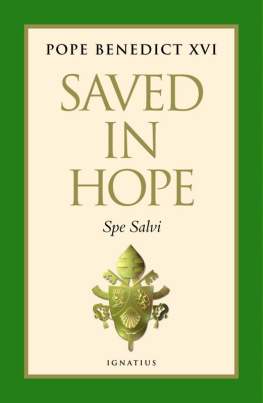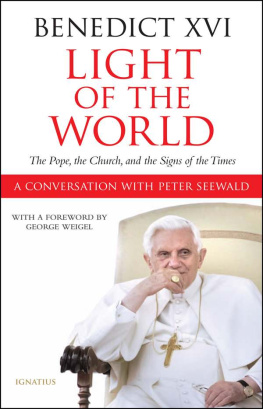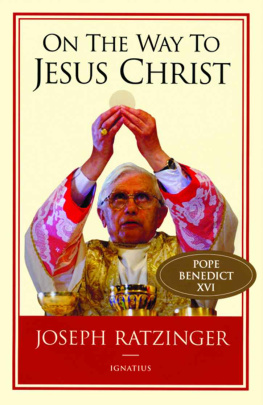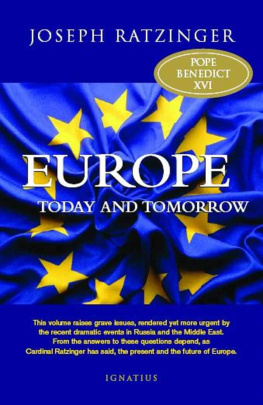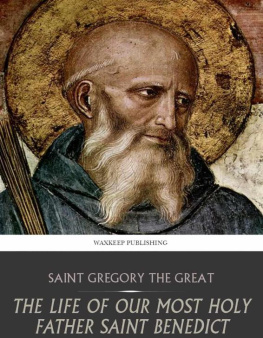Pope Benedict in America
Pope Benedict XVI
Pope Benedict in America
The Full Texts of Papal Talks
Given during His Apostolic Visit
to the United States
IGNATIUS PRESS SAN FRANCISCO
Cover photograph:
Pope Benedict XVI on the South Lawn at the White House
in Washington, D.C .
Stefan Zaklin/epa/Corbis
Jacket design by Roxanne Mei Lum
2008 by Libreria Editrice Vaticana, Vatican City
2008 by Ignatius Press, San Francisco
All rights reserved
ISBN 978-1-58617-293-0
Library of Congress Control Number 2008929465
Printed in the United States of America
CONTENTS
FOREWORD
THE ULTIMATE PURPOSE OF OUR LIVES
People today need to be reminded of the ultimate purpose of their lives . They need to recognize that implanted within them is a deep thirst for God.
Benedict XVI, To U.S. Bishops at the National Shrine,
Washington, D.C.
Is not this ongoing intellectual conversion as necessary as moral conversion for own growth in faith, our discernment of the signs of the times, and our personal contribution to the Churchs life and mission?
Benedict XVI, Saint Patricks Cathedral, New York
I
During the flight from Rome to Andrews Air Force Base in Washington, the Holy Father was asked a number of questions posed by the Vatican Press Secretary, Father Federico Lombardi, S.J. One question concerned the nature of the American polity itself. All through his stay here, the Pope, not surprisingly and scholar that he is, showed a remarkable appreciation of the uniqueness and importance of the American founding. He knew where he was going.
What I find fascinating in the United States is that they began with a positive concept of secularity, Benedict remarked,
because this new people was composed of communities and individuals who had fled from the State Church and wanted to have a lay, a secular State that would give access and opportunities... to all forms of religious practice. Thus, an intentionally secular new State was born; they were opposed to a State Church. But the State itself had to be secular precisely out of love for religion in its authenticity, which can only be lived freely. And, thus, we find this situation of a State deliberately and decidedly secular but precisely through a religious will in order to give authentically to religion.
Secularity is not secularism. Secularism, of which the Pope often speaks, is an ideology denying that there is anything but this world. Secularity means, rather, that, while not everything, the State and the culture have their own relative autonomy and purpose. The Church is not to run the State, nor vice versa. In the full order of things, both have a proper place in the defining of which the American founding was a pioneering example of what might work for the common good of both Church and State.
Benedict gave some fifteen major addresses during his six-day stay in Washington, D.C. and New York. These addresses are collected in this volume. The papacy is a unique institution. Its authority is personal in that it resides, by virtue of its divine founding, in a living person, not in some committee or collectivity. This concreteness makes the papacy in many ways the most visible office in the world. The person and personality of the reigning pontiff are seen in this individual man in white. He greets and is greeted. He smiles and looks with interest at what he sees. By choice, he speaks to everyone he can from the powerful to the poor, from the old and sick to the young and vigorous. He loves families and academic settings. He speaks to the United Nations Assembly and chats with the American president. His is a commanding presence in the media. He says things that no one else will much talk about, things like God, the difference between good and evil, the responsibility of Bishops, the dignity of man, the love of the weak, and the end of all things.
Benedict XVI is an amazingly learned man. He has written some seventy-five books and heaven knows how many scholarly and popular essays. There is no one else in any public office in the world who has anywhere near his breadth of knowledge and scholarship. Though he speaks the German academic tongue with the best of them, his writings are strikingly straightforward and clear, not unlike those of the philosopher Josef Pieper, whom he often cites. One sensed that the media understood this somehow, that this man was on top of every subject and operated at a depth few could match. The papacy does have the duty of teaching, and Benedict does teach. He also thinks and ponders. What is characteristic of him is that he not only speaks authoritatively when he must, but that, for the most part, he offers what he says on the grounds of common sense and reason. He goes directly to the minds and hearts of his readers or listeners.
II
In the beginning, I cited two passages from the Holy Fathers addresses in the United States. The first reminds us that there is an ultimate purpose to human lives, that within each of us, not just Catholics, there is a search for God. To state such a truth in public in an objective, non-polemical way is what a pope can do that almost no one else can in quite the same way. In the second citation, the Pope tells us that we not only must live well, be virtuous, obey the commandments, but must think well, know what it is all about. Benedict never hints that thinking well and living well are not intimately related. Each in a proper way leads to the other, something Aristotle knew also. Benedict does not imply that everyone is a paragon of virtue or a towering intellect. But he does insist that virtue and truth belong and should belong to each of us.
What I will do in this foreword is to say something about each of Benedicts major speeches. Each is worth a careful read. Sometimes we have to read what we have heard or hear what we have read in order to see what is being taught us. We also need to read things several times and at different stages in our lives. This is the advantage of a printed book. It can be read again and again. These addresses will, I think, remain significant. They will be seen as profound contributions to the penetrating thought of this Pope.
On the White House Lawn (April 16), in the presence of President and Mrs. Bush, Benedict said: I am confident that the American people will find in their religious beliefs a precious source of insight and an inspiration to pursue reasoned, responsible, and respectful dialogue in the effort to build a more humane and free society. He even cited the famous Farewell Address of our first president, George Washington, that expresses the conviction that religion and morality represent indispensable supports of political prosperity. Benedict starts right off calling all Americans to be worthy of their own tradition of reasoned and responsible thought.
At the National Shrine, Benedict addressed the U.S. Bishops. The Pope spoke of John Carroll, the first Bishop of Baltimore, and of the founding of the early American dioceses. He recalls the Twin Towers attack and the New Orleans hurricane, together with American generosity in the aid of others throughout the world. A Bishop is to ask himself how he can lead his people to an encounter with the living God . In a much publicized remark, the Pope acknowledged something that has caused deep shame: the sexual abuse of minors. In other words, when there is a problem, one should deal with it in the most straightforward manner. The Pope was much praised for his frank stance here.
On the importance of the family and its problems, Benedict was observant. We have an alarming decrease in the number of Catholic marriages in the United States together with an increase in cohabitation, in which the Christ-like mutual self-giving of spouses, sealed by a public promise to live out the demands of an indissoluble lifelong commitment, is simply absent. The Bishops were left with a clear agenda.
Next page
